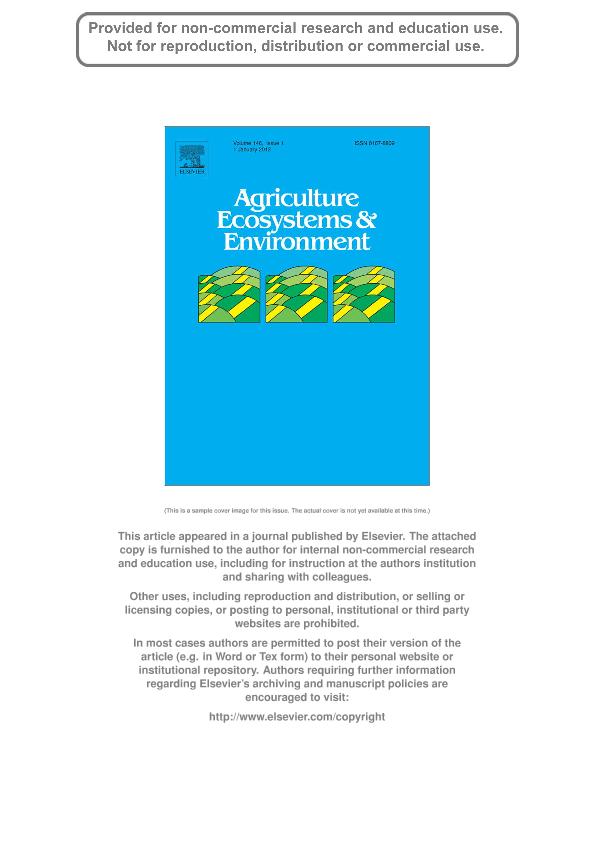Mostrar el registro sencillo del ítem
dc.contributor.author
Zumoffen, Leticia

dc.contributor.author
Salto, Cesar

dc.contributor.author
Salvo, Silvia Adriana

dc.date.available
2023-05-12T14:17:51Z
dc.date.issued
2012-09
dc.identifier.citation
Zumoffen, Leticia; Salto, Cesar; Salvo, Silvia Adriana; Preliminary study on parasitism of aphids (Hemiptera: Aphididae) in relation to characteristics of alfalfa fields (Medicago sativa L.) in the Argentine Pampas; Elsevier Science; Agriculture, Ecosystems and Environment; 159; 9-2012; 49-54
dc.identifier.issn
0167-8809
dc.identifier.uri
http://hdl.handle.net/11336/197292
dc.description.abstract
Alfalfa is a perennial crop and is one of the most relevant forage resources for cattle in the Argentine Pampas, with aphids (Hemiptera Aphididae), one of the main pest insects in alfalfa, being frequently attacked by a rich fauna of aphidiinae parasitoids (Hymenoptera: Braconidae). The aim of this study was to identify the possible field characteristics that influence the parasitism rates of aphids in alfalfa, in order to recommend simple methods of environmental manipulation to enhance the action of parasitoids. The abundance of aphids and their parasitism were estimated fortnightly, over a period of seven months in fourteen alfalfa fields located near the city of Rafaela, Santa Fe, through the collection of stem cuttings. The influence of field size, age of crop, and percentage of borders with spontaneous vegetation, on aphid abundance and their parasitism rates, were assessed through general lineal models with repeated measures. Greater aphid populations were observed in fields with a low percentage of natural borders, whereas the impact by parasitoids was higher in older crops and in those fields with a high percentage of natural borders. The relative importance of the characteristics of fields on parasitism of aphids is discussed, bearing in mind that conservation is the strategy of biological control recommended for developed countries given its low cost and potential sustainability.
dc.format
application/pdf
dc.language.iso
eng
dc.publisher
Elsevier Science

dc.rights
info:eu-repo/semantics/openAccess
dc.rights.uri
https://creativecommons.org/licenses/by-nc-sa/2.5/ar/
dc.subject
APHID DENSITY
dc.subject
CONSERVATION BIOLOGICAL CONTROL
dc.subject
CROP AGE
dc.subject
NATURAL BORDERS
dc.subject
NON-CROP VEGETATION
dc.subject.classification
Agricultura

dc.subject.classification
Agricultura, Silvicultura y Pesca

dc.subject.classification
CIENCIAS AGRÍCOLAS

dc.title
Preliminary study on parasitism of aphids (Hemiptera: Aphididae) in relation to characteristics of alfalfa fields (Medicago sativa L.) in the Argentine Pampas
dc.type
info:eu-repo/semantics/article
dc.type
info:ar-repo/semantics/artículo
dc.type
info:eu-repo/semantics/publishedVersion
dc.date.updated
2023-05-11T17:39:12Z
dc.journal.volume
159
dc.journal.pagination
49-54
dc.journal.pais
Países Bajos

dc.journal.ciudad
Amsterdam
dc.description.fil
Fil: Zumoffen, Leticia. Instituto Nacional de Tecnología Agropecuaria. Centro Regional Santa Fe. Estación Experimental Agropecuaria Rafaela; Argentina. Consejo Nacional de Investigaciones Científicas y Técnicas. Centro Científico Tecnológico Conicet - Santa Fe; Argentina
dc.description.fil
Fil: Salto, Cesar. Instituto Nacional de Tecnología Agropecuaria. Centro Regional Santa Fe. Estación Experimental Agropecuaria Rafaela; Argentina
dc.description.fil
Fil: Salvo, Silvia Adriana. Consejo Nacional de Investigaciones Científicas y Técnicas. Centro Científico Tecnológico Conicet - Córdoba. Instituto Multidisciplinario de Biología Vegetal. Universidad Nacional de Córdoba. Facultad de Ciencias Exactas Físicas y Naturales. Instituto Multidisciplinario de Biología Vegetal; Argentina
dc.journal.title
Agriculture, Ecosystems and Environment

dc.relation.alternativeid
info:eu-repo/semantics/altIdentifier/url/https://www.sciencedirect.com/science/article/abs/pii/S0167880912002459
dc.relation.alternativeid
info:eu-repo/semantics/altIdentifier/doi/http://dx.doi.org/10.1016/j.agee.2012.06.019
Archivos asociados
